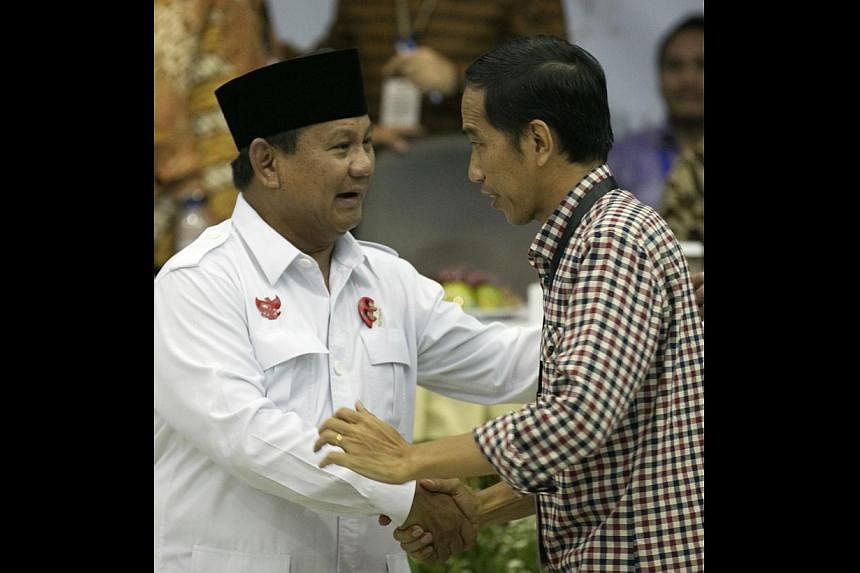Damned if you do, damned if you don't - that is the dilemma of some voters ahead of the presidential election.
Those deciding to vote for Mr Prabowo Subianto might trust his seemingly determined attitude to solve all the nation's urgent problems but may doubt his human rights record.
Meanwhile, those bent on voting for Mr Joko "Jokowi" Widodo must hope he can ignore the influence of the likes of Mr Hendropriyono, the former National Intelligence Agency (BIN) director whose deputy was accused, then acquitted, of masterminding the murder of activist Munir, to mention just one case.
Unless we can ensure equal treatment of victims from our long list of past abuses, the emerging perception that some victims' need for justice is more important than others could be more divisive than cheering for one or the other candidate. Already the missing activists of the 1990s are gaining prominence, due to Mr Prabowo's presidential bid, compared with victims of other cases that allegedly implicate Mr Prabowo and other military or police officers.
The work on ensuring human rights for all reveals the main challenge for whoever becomes president - among others, the common conviction in the New Order's version of history, despite exposure to other versions since Reformasi, together with the legacy of bullying others into conformity.
Therefore, part of the task still lies in raising awareness that it is not fine to neglect victims of past rights abuses, just because they supposedly got what was coming to them as a result of defying citizens' duties under Suharto, such as maintaining law and order and avoiding trouble by not joining movements critical of the rulers, or by being in the wrong place at the wrong time.
Today, one shouldn't join the wrong religious group either - for aspiring rulers have accommodated zealous groups shouting in the name of God, virtually condoning their insistence that those attacking minorities are the real victims of groups threatening the "real" Islam - the faith of the majority viciously suppressed in their political aspirations under Suharto.
Therefore, democratic values in the form of respecting differences still have a long way to go. Consider that as recently as 2011, there was little outrage at the shooting in the third Papuan People's Congress.
Surely, many surmised, those assembled deserved to be shot at and arrested for declaring Papua's independence, as they were subversive. Suharto was dead by then; his successor B.J. Habibie had annulled the 1963 law on subversion and the country had amended its Constitution to guarantee freedom of expression and opinion. So another part of the task is educating the public that you don't shoot people for wanting separation from the unitary republic, even though it is a perceived sacrosanct legacy fought for and won with blood and tears from colonialists and insurgents.
Maybe it is a good idea to ask why some want independence.
Another task is continuing the drafting of the truth and reconciliation Bill since the law on the matter was annulled by the Constitutional Court. The plaintiffs rejected the clause in the law that could rule amnesties for human rights violators. The court annulled the entire law - and the movement to push through a new Bill lost steam.
Even the notion of "truth and reconciliation" was met with much resistance because the parties to be reconciled included those directly affected until today by various conflicts, notably the 1960s upheaval.
According to which side your family was on, it was either the communists or anti-communists who were to blame for the mutual harassment, persecution, intimidation and lifelong loss of freedom, education, livelihoods and functional families.
Proceedings of truth and reconciliation would expose truths other than those mostly accepted; all sides affected by the 1960s conflict might have to acknowledge each shared part of the blame, at least in the eyes of the others. Therefore even one single case - that of the 1960s upheaval - remains divisive for society.
The camp of Jokowi, under the wing of Ms Megawati Sukarnoputri, chairman of the Indonesian Democratic Party - Struggle (PDI-P), might be more emboldened in addressing human rights as indicated in his "vision and mission".
Ms Megawati's late husband Taufiq Kiemas had - while he was Speaker of the People's Consultative Assembly - set up a forum bringing together victims of various conflicts, including the adult orphans of the generals and communist leaders slain in the 1960s.
Such a measure from a state official increased a little the acknowledgment that more than one side suffered from the "communist coup attempt", which scholars say was the main narrative that sustained the entire existence of the New Order.
The challenge is that some civilian and military campaigners in either candidate's camp still likely believe that those who were considered to be threatening "stability" deserved persecution and detention or kidnapping, torture and murder to protect the nation.
"I am the toughest human rights defender in the republic," stated Mr Prabowo in the first presidential candidate debate, referring to his military career. Soldiers, on the order of their commanders, would do anything necessary to protect citizens from any kind of threat, he said.
It is not yet clear what the human rights movement is planning.
If Mr Joko becomes president, he must convince doubters that he is not under Ms Megawati's wing - for the PDI-P, like other parties, has been known for its strong "nationalist" support for whatever state action is deemed necessary to crush insurgents such as those in Aceh, Papua and today's Timor Leste, as also shown by the government of then president Megawati.
The new president will have a grand opportunity to start afresh. Such efforts would need the ability of either candidate to inspire us that ensuring law enforcement - a similar element of their "vision and mission" - does not justify the persecution and murder of people in the name of the republic, or the "pure" Islam.
JAKARTA POST/ASIA NEWS NETWORK

